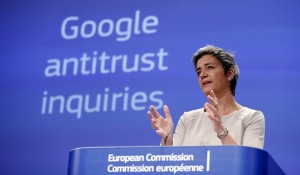
Margrethe Vestager, European competition commissioner
23 June 2015 – Last week the European Commission sent a redacted version of its charge sheet against Google to more than six parties that complained that the Internet giant discriminated against them in ranking shopping searches.
The document, which runs to about 120 pages according to people who have received it, will eventually go out to the roughly 20 companies and organizations, including Microsoft, Yelp, and the consumer group BEUC, that have argued Google abused its market power by favoring its own services over those of competitors.
The Commission invited the complainants to send additional evidence that could help the regulator mount its case. Complainants can also ask for an explanation of why certain parts of the document were redacted.
Google, which handles more than 90 percent of the Internet searches in Europe, has asked the Commission for more time to respond to the Commission’s allegations and prepare its defense, according to two people with direct knowledge who requested anonymity. The Commission formally charged Google on April 15 and Google’s original deadline to answer was believed to have been July 7.
There is speculation about whether Google will request a hearing with the Commission on the charges. Several lawyers involved in the proceedings have suggested that the hearing would provide an opportunity for complainants to air their grievances, drowning out Google’s defense.
Google did not immediately respond to requests for comment. The Commission would only say that Google was “within its rights” to ask for an extension, without confirming that it had.
Before sending out its statement of objections, the Commission demanded all parties sign an extensive non-disclosure agreement to prevent them from sharing the document. In a rare step, all copies were watermarked with the name of the complainant to prevent leaks.